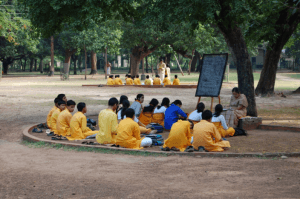Shantiniketan is a small town near Bolpur in the Birbhum district of West Bengal, India, and approximately 180 kilometres north of Kolkata (formerly Calcutta). It was made famous by Nobel Laureate Rabindranath Tagore, whose vision became what is now a university town ( Visva-Bharati University ) that attracts thousands of visitors each year. Shantiniketan is a tourist attraction also because Rabindranath lived here and penned many of his literary classics (namely Tagore songs {or ‘Rabindra Sangeet’}, poems, novels etc.) and his home is a place of historical importance. Shantiniketan became a spiritual centre where people from all religions were invited to join for meditation and prayers. On December 22nd 1901, Rabindranath Tagore started a school at Shantiniketan named Brahmachary Asrama modelled on the lines of the ancient gurukul system. After he received the Nobel Prize which enhanced not only the pride of India but also the Prestige of Shantiniketan the school was expanded into a university. It was renamed Visva Bharati, it’s symbolic meaning being defined by Tagore as “where the world makes a home in a nest”. The aim of this educational institute was the quest for truth, blending the methods of learning of the East and West.
Visva Bharati, now more than a hundred years old, is one of the most prestigious universities of India with degree courses in humanities, social science, science, fine arts, music, performing arts, education, agricultural science and rural reconstruction. At Tagore’s behest, the annual Paus utsav became an important cultural event where students and teachers of his school took an active part. Paus Mela, therefore, becomes a meeting ground for urban people and rural folk. Rural artisans bring their wares like batik printed materials, the most famous Shantiniketan Leather bags, earthen wares, paintings, etc, to the fair while urban relatives set up stalls so that rural people could buy the new industrially produced goods that was revolutionizing life in the cities. While it has not discarded its traditional value systems the educational system founded by Tagore thus proves to have also kept pace and evolved with changing times.
Home at Shantiniketan would surely call for peaceful Residential Neighbourhood at Shantiniketan amidst the greenery all around. Thus here comes Upoban the new concept of housing complex launched as a joint venture of Bengal Ambuja Housing Development Limited and Sriniketan Shantiniketan Development Authority who enhances on materializing their vision of setting a well facilitated Residential neighbourhood at Shantiniketan with utmost satisfaction of its residents.
Weather in Shantiniketan is usually a pleasant one although you will come across the normal weather changes during Summer, winter and Monsoon. Nonetheless Spring has its own charm in Shantiniketan not only because of its natural beauty blooming to its fullest amidst the lush greenery but also due to the famous Vasanta Utsav held to mark the festival of Holi with the onset of Spring.
Some SnapShots of Shantiniketan …

Writing about ‘Shantiniketan’ can fill up numerous pages and even then there will be much to talk about.Thus, to sum up, Shantiniketan is the pride of India. A lot of cultural and artistic values comprises Shantiniketan. Visva- Bharati being another major draw. Students from abroad come to Shantiniketan to pursue their studies at Visva-Bharati. Once you are at Shantiniketan, you can feel the calmness and peacefulness of nature. Shantiniketan resembles harmonic peace between Man and Nature, and to justify that, the festivals of Shantiniketan came into existence, all started off by the Great Nobel laureate Rabindranath Tagore himself.
Shantiniketan is well-known for handicrafts, big and small. There are many leather, paper, jute and other small scale industries in Shantiniketan, making articles of daily use. Large amount of handiwork industries proves zero unemployment. Even the boul-singers, who earns by singing, are famous in Shantiniketan and nowadays,traveling all across the globe to manifest their talent.People of Shantiniketan believe that whatever be the caste, class, or religion, they are all humans, and this is one of the many reasons for prevalence of peace in Shantiniketan.
<
p style=”text-align: justify;”>Thus, Shantiniketan deserves its name and its English translation- ‘The Abode of Peace’, holds true for such a wonderful place.














